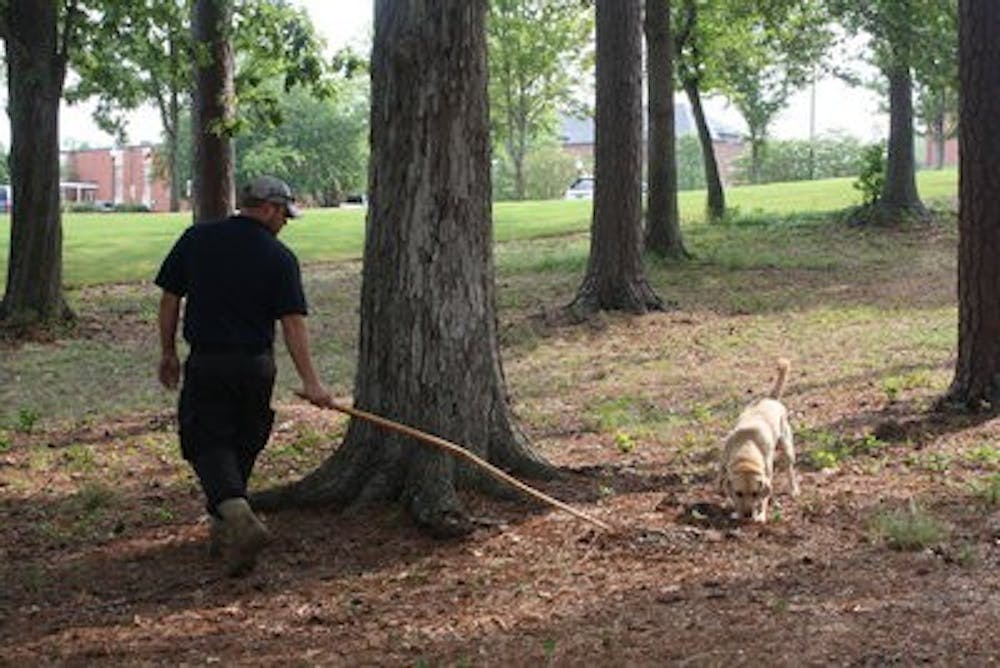It's not strange to see a dog sniffing a tree, but it might be strange to know that by sniffing, the dog is saving the tree's life.
The EcoDogs program is using this novel technique. One of the program's projects is to train dogs to sniff out a deadly fungus in pine trees before it kills the trees.
"The advantage to using the dogs would be that we'll be able to find out if the trees are infected before it's showing above-ground symptoms," said Jason Dewitt, dog handler for the Animal Health and Performance Program.
The dogs are trained to smell the fungus in the tree roots, then sit on that spot and look to their trainer to indicate they have picked up the scent.
Charm and Opie, two Labrador Retrievers, are using their noses to detect the fungus.
"They have really good noses," Dewitt said. "Because this odor is underground, we need a dog with an exceptional nose that checks everything."
Charm and Opie started as explosive-detection dogs and were chosen for this program because they are so good at what they do.
"With this, you have to have a 100-percent trust in your dog, and these dogs don't false," DeWitt said. "They don't sit when it's not the odor, and they are very methodical."
The dogs go through an extensive training process to be able to detect the lethal fungus, and up to this time, the dogs have shown to be infallible at the task.
"When we go out and do searches, they not only take samples from where our dogs indicate; they take samples around the area to make sure the dogs aren't missing anything, and so far we haven't missed," DeWitt said.
The purpose of training the dogs is to prevent Southern pine decline. This decline is occurring because of diseases that come from a fungus carried by beetles.
There are four species of fungi that affect the trees and are under the same genus Leptographium.
Procerum and terecrantis are native to the United States and serpens and huntii are both invasive species.
"When the trees get stressed\0xAD-- and they can be stressed because of drought--they can be stressed because of fire, they can stressed because of having equipment go through the woods and causing oil compaction, so anything that stresses the tree causes the tree to give off a chemical that attracts beetles," said Lori Eckhardt, associate research professor of integrated forest pathology and entomology.
After the beetles attack the root system of the pine trees, the fungus begins to grow in the system and causes the root to die, which causes the tree to die.
Symptoms include yellow green needles, sparse tree crowns with heavy cone crops and limited stem diameter growth.
"The bad part is, once you see the above-ground symptoms like that, it's too late to do anything to save the trees," Eckhardt said. "We're hoping to use the dogs as early detection."
Todd Steury, co-creator of EcoDogs and assistant professor of wildlife ecology, said he believes people will want to use the dogs, but it is important for program get as much information about it out to the public.
"We're doing OK, but the hope is to increase the amount of business," Steury said. "I think that to do that, all we have to do is get out name out there."
The cost of the EcoDogs program is $2,000 a week, and up until now it has been paid by the Alabama Agricultural Experiment Station grant, which was used to begin the program.
"My hope is just that it continues to grow," Stuery said. "Right now the program is in the red basically. We're not generating enough business to compensate for the cost of having full-time handlers and vehicles and stuff like that."
Do you like this story? The Plainsman doesn't accept money from tuition or student fees, and we don't charge a subscription fee. But you can donate to support The Plainsman.





